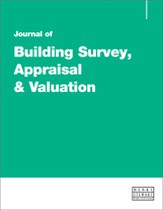Inclusive environments: Access to commercial property, goods and services — disability-specific access requirements
Abstract
It has been nearly 30 years since the introduction of the first bespoke legislation preventing discrimination against disabled people in accessing commercial property, goods and services. Despite the rise in public awareness of disability promoted by the Paralympics, a global financial crisis, austerity and the COVID-19 pandemic appear to have taken disability rights off both the political and social agendas. Research published in 2020 identified commercial value in providing a truly inclusive built environment and for commercial property owners as well as those delivering goods or services to seek opportunity over obligation in providing above-minimum access. In an attempt to challenge the notion of a ‘one size fits all’ approach to access, this paper analyses disability-specific access needs as well as unpick the term ‘reasonable adjustment’. The paper focuses primarily on the access to buildings and not the accessibility of actual service provision. The paper identifies that the complexity of disability, the wide-ranging symptoms of individual impairments and the prevalence of those with more than one condition validates a one-size approach to designing for disabled people. Furthermore, when comparing the delivery of best practice solutions to facilitate access, the paper demonstrates that the majority of the necessary adjustments are essential (critical) and not just reasonable. While this is based upon the experiential understanding of access challenges by disabled people, it is also worth noting that there exist significant challenges from a service provision perspective in proving an inclusive environment. Removing the existing physical barriers within the built environment may be difficult and costly, and may appear unreasonable for some smaller organisations. Despite this, however, there are a number of relatively low-cost, high-priority adjustments that can make a difference. These, along with more complex adjustments, mean it is necessary to adopt a balanced, pragmatic notion of compromise that facilitates access while still being commercially viable.
The full article is available to subscribers to the journal.
Author's Biography
Adrian Tagg BSc (Hons) MRICS is an Associate Professor at the University of Reading (UoR). He has over 25 years’ experience as a practitioner working in the UK as well as mainland Europe and is currently the lead for building surveying at UoR as well as the founder of Tech DD Ltd. Adrian was awarded the title of Associate Professor in 2019 and lectures in building pathology, commercial surveying practices as well as inclusive environments. His research and practice interests concern technical due diligence (TDD), planned preventative maintenance (PPM), commercial surveying and accessibility in the built environment. He was the appointed lead author of the RICS Global Note Planned Preventative Maintenance of Commercial and Residential Property (RICS, 2022) as well as sole author of the textbook Technical Due Diligence and Building Surveying for Commercial Property (Routledge, 2018). As a member of the RICS Built Environment Journal (BEJ) Editorial Advisory Group, Adrian has written a number of articles on current topics including TDD, PPM, inclusivity and artificial intelligence (AI).
Citation
Tagg, Adrian (2025, January 1). Inclusive environments: Access to commercial property, goods and services — disability-specific access requirements. In the Journal of Building Survey, Appraisal & Valuation, Volume 13, Issue 3. https://doi.org/10.69554/QYNP3593.Publications LLP
